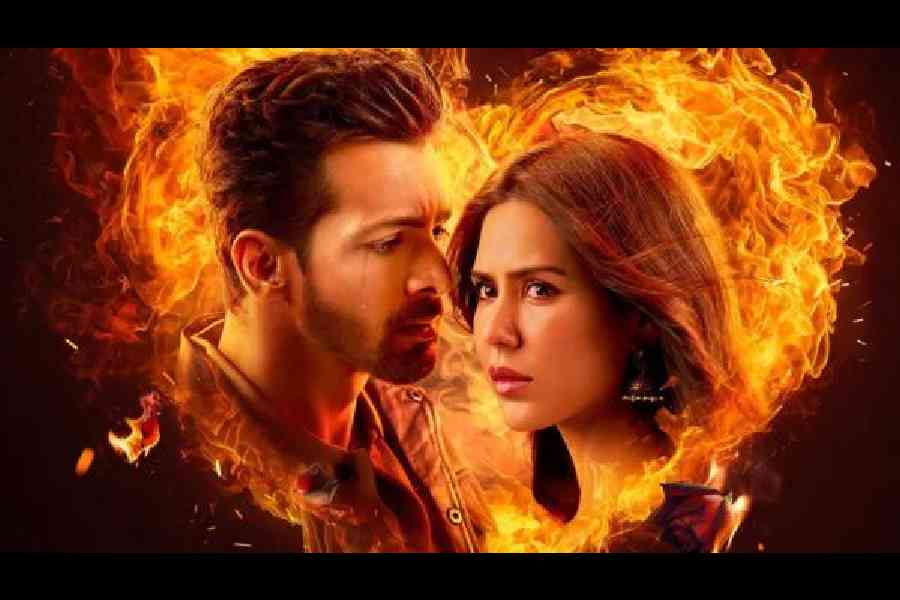Bollywood audiences’ preference for passionate love stories is no secret, especially in the aftermath of Saiyaara’s success. Bursting into theatres in the middle of the Diwali holidays, Ek Deewane Ki Deewaniyat was expected to be another great crowd-puller, offering the regular mix of drama, emotion and action to keep audiences suitably entertained.
However, director Milap Zaveri’s latest offering tries to be more than just another romance. It attempts to go beyond its plot that deals with an obsessive and unrequited love affair to preach feminist ideas, but unfortunately, gets trapped in its own design while trying to break the mould.
Ek Deewane Ki Deewaniyat tells the story of Vikramaditya (Harshvardhan Rane), a man in a position of power, whose irrational, almost neurotic love for a beautiful actress Adaa (Sonam Bajwa) unleashes her egotistical self, leading to disastrous consequences.
Starting off in a straightforward boy-meets-girl format, the love story takes off quickly enough and with no fuss. Both Vikramaditya and Adaa are introduced as young achievers who have earned fame and popularity but are both grounded, compassionate and kind, and their simplicity and generosity appear to attract each other. With the reputation of being a great onscreen lover, and with his chiselled and rugged good looks, Rane of Sanam Teri Kasam fame tries too hard to get it right this time. He is given a grand screen entry befitting that of superstars and is clearly the character with the most commanding presence in the film. And though his expressions of love may be as sincere as they can get, his dialogues are definitely cringe-worthy and delivered in an over-dramatised way. His articulations of frustration, anger and agony are also somewhat theatrical, to put it mildly.
Sonam Bajwa looks attractive and innocent and perhaps fits the character of a morally-upright person with high principles, but spouting bombastic dialogues like her male counterpart every time she speaks does not do her role any good either. In trying to break Vikramaditya’s resolve as he tries to win Adaa over, Bajwa tries to make her character speak like a true-blue feminist, but her typically ‘filmy’ speeches delivered in melodramatic style fail to make her words convincing.
An interesting and original aspect of Ek Deewane Ki Deewaniyat is that it tries its best to distinguish between an honest and persistent pursuit by a lover from an unhealthy obsession. The story attempts to give a somewhat rational explanation for Vikramaditya’s pursuit of Adaa and also makes it very clear that no matter how hostile or disrespectful she may have been to his advances, he never harbours any ill feeling towards her, nor tries to coerce or threaten her into submission, though he is extremely possessive of her from the very beginning. It is also significant that though the film has received an ‘adult’ rating from the censors, the director makes it clear from the outset that Vikramaditya’s love is purely emotion-driven and lust has no role to play in his feelings for her. Adaa’s reactions can instead be interpreted as stubborn and irrational, especially in light of her change of heart in the end.
The screenplay, which is partly responsible for the faults in the cast’s performances, also suffers from an overload of incidents (like Adaa’s father being beaten up by his colleagues or her sister feeling threatened by Vikramaditya’s goons), especially post-intermission, some of which were avoidable and have no bearing on the central love story. The plot structure tries to fit in all characters and to give each of them something to do that is relevant to the main action, but that only makes the story clumsier and more complicated, along with the inclusion of some scenes of uncalled-for violence.
Sachin Khedekar as Vikramaditya’s shrewd politician father and Anant Mahadevan as Adaa’s father are given bit roles that could have been explored more creatively. What salvages Ek Deewane Ki Deewaniyat from becoming utterly forgettable is its music, with composers DJ Chetas and Rajat Nagpal churning out soul-stirring tracks that will be staples in every Indian music lover’s romantic playlist this season.
My favourite love story bordering on obsession is... Tell t2@abp.in










